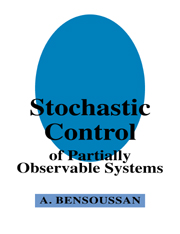Book contents
- Frontmatter
- Contents
- Preface
- 1 Linear filtering theory
- 2 Optimal stochastic control for linear dynamic systems with quadratic payoff
- 3 Optimal control of linear stochastic systems with an exponential-of-integral performance index
- 4 Non linear filtering theory
- 5 Perturbation methods in non linear filtering
- 6 Some explicit solutions of the Zakai equation
- 7 Some explicit controls for systems with partial observation
- 8 Stochastic maximum principle and dynamic programming for systems with partial observation
- 9 Existence results for stochastic control problems with partial information
- References
- Index
3 - Optimal control of linear stochastic systems with an exponential-of-integral performance index
Published online by Cambridge University Press: 16 September 2009
- Frontmatter
- Contents
- Preface
- 1 Linear filtering theory
- 2 Optimal stochastic control for linear dynamic systems with quadratic payoff
- 3 Optimal control of linear stochastic systems with an exponential-of-integral performance index
- 4 Non linear filtering theory
- 5 Perturbation methods in non linear filtering
- 6 Some explicit solutions of the Zakai equation
- 7 Some explicit controls for systems with partial observation
- 8 Stochastic maximum principle and dynamic programming for systems with partial observation
- 9 Existence results for stochastic control problems with partial information
- References
- Index
Summary
Introduction
In Chapter 2 (see comments) we have seen the concepts of certainty equivalence and the separation principle. Again the main idea is that an optimal control for a stochastic control problem with partial observation can be obtained by a feedback rule (deterministic of course) applied on the Kalman filter (the best estimate of the state). As we shall see in later chapters, this situation is by no means general. The ‘sufficient statistics’, to which one applies a feedback rule, are in general infinite dimensional (as will be seen it is the conditional probability distribution), and thus does not reduce to a single moment, the conditional mean. Some natural questions arise at this stage. Can we find examples in which the sufficient statistics are finite dimensional, for instance several moments (conditional mean and conditional variance)? Note that if this holds, then the dimension of the sufficient statistics, although finite, is larger than that of the state. In this chapter we will study a different situation. We shall meet a situation where the optimal control is given by feedback on sufficient statistics, which are finite dimensional, with a dimension which is the same as that of the state, but does not coincide with the conditional mean, the best estimate of the state. It is clearly a situation where the separation principle does not hold, but from a computational viewpoint offers the same simplicity as that when the separation principle does hold.
The situation that we consider here is naturally very specific again, and corresponds to linear dynamics, with linear observation, and a payoff which is the exponential of the standard quadratic functional.
- Type
- Chapter
- Information
- Stochastic Control of Partially Observable Systems , pp. 53 - 73Publisher: Cambridge University PressPrint publication year: 1992



